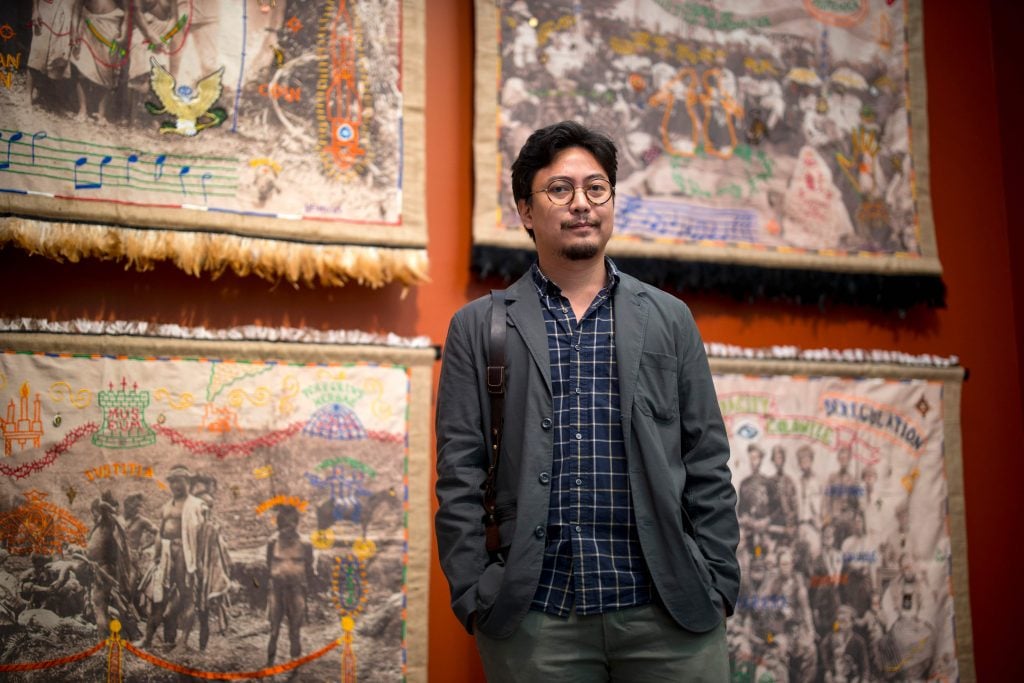Law & Politics
Biennale Star Cian Dayrit Was One of Dozens of Artists Arrested in the Philippines for Supporting Farmers’ Rights
The Filipino multimedia artist was detained for four days.

The Filipino multimedia artist was detained for four days.

Rebecca Anne Proctor

Multimedia artist Cian Dayrit was arrested during an event for farmer’s rights last Thursday in the Philippines.
Alongside around 50 artists, Dayrit was detained at a gathering that marked the 34th anniversary of the failed Comprehensive Agrarian Reform Program, which was supposed to redistribute private and public agricultural lands in the southeast asian country to help the people survive as small independent farmers. Many say not enough has be done in the decades since the 1988 initiative was put in place.
Dayrit was among a group of artists and cultural workers supporting land, justice, and food security, who were there to lend support to farmers taking part in a land cultivation demonstration called “Bungkalan.” At these events, peasants assert ownership over their land by planting agricultural products that address their need for food.
They were detained while tilling a two-hectare area that is locked in a dispute at Barangay Tinang in Concepcion town in the Tarlac province. Detained with the artists were several members of a prominent farmers’ group.
The aim, Dayrit told Artnet News “was to show the genuine need for agrarian reform. He added that they had the legal right to be there. “This wasn’t a protest,” said the artist, who was released on Sunday, June 12. “We were just there to help.” Dayrit said the police rounded them up and brought them to the nearby police station.
The Filipino artist, who recently emerged as one of the stars of the biennial circuit in a data report by Artnet News, is known for his cartographic artworks that take the form of embroidery, textiles, or mixed media collages. His practice explores imperialism and feudalism through activities such as the extraction of natural resources and the displacement and exploitation of marginalized populations. His works have been included at the Gwangju Biennale 2021 and the Sydney Biennale and Kathmandu Triennale, both this year.
Dayrit described poor conditions at the police station. “There were so many of us that we couldn’t fit inside the small jail cells, so for most of the four days we were heavily guarded in the parking lot outside,” Dayrit said. On the last day, the police chief forced them into the cramped cells where people had to take turns sitting down and standing up, the artist said.
While everyone has now been released, they need to attend a court hearing this Friday, June 17 in Concepcion town. “We need lawyers to represent us in smaller groups,” said Dayrit, who has his own lawyer. “Not everyone has a lawyer yet and we are working to ensure everyone is represented.”
The farming reform bill at issue was signed by the late president Corazon Aquino in 1988, and was supposed to be completed after ten years with the distribution of about eight million hectares of land. Its goals are meant to provide landowners equality in terms of income and opportunities, empower landowner beneficiaries to have equitable land ownership, enhance agricultural production and productivity, provide employment to more agricultural workers, and put an end to conflicts regarding land ownership.
Yet the law is considered a failure and after its 34 years, farmers still long for their own land.
“Ultimately, farmers still remain landless, which is one of the biggest contradictions: the people who produce food have the least access to the land and the land is being used for cash crops instead of real food,” said Dayrit.